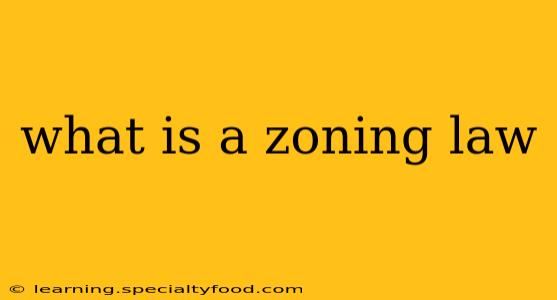Zoning laws are local government regulations that dictate how land within a municipality can be used. They're a critical component of urban planning, aiming to organize and control the development of a community to ensure it functions efficiently and meets the needs of its residents. Think of them as the rulebook for how your city or town is built and structured. These laws aren't about aesthetics alone; they impact everything from property values to the environment.
What does zoning regulate?
Zoning laws control a wide range of land uses, including:
-
Residential: This covers areas designated for houses, apartments, and other dwelling places. Zoning often specifies the density (number of units per acre), building height, and lot size.
-
Commercial: This includes areas for businesses, shops, offices, and retail establishments. Zoning regulations for commercial areas might address parking requirements, building setbacks (distance from property lines), and signage.
-
Industrial: This zone is for factories, warehouses, and other industrial activities. Regulations here frequently focus on environmental protection, noise levels, and safety.
-
Agricultural: These areas are reserved for farming and related activities. Zoning may protect farmland from encroachment by other land uses.
-
Mixed-Use: This increasingly common zoning category allows for a combination of residential, commercial, and sometimes industrial uses in the same area. This can create vibrant, walkable neighborhoods.
How are zoning laws created and enforced?
Zoning laws are typically established by a local government, such as a city council or county board of supervisors. The process often involves public hearings and community input to ensure the regulations reflect the needs and desires of the residents. Enforcement is usually handled by a local planning or zoning department. They review development proposals to ensure they comply with the zoning ordinances and can issue permits or deny applications based on compliance.
What are the benefits of zoning laws?
Zoning laws offer numerous benefits, including:
-
Protecting Property Values: By preventing incompatible land uses from being placed next to each other (e.g., a factory next to a residential area), zoning helps to maintain and even increase property values.
-
Promoting Public Health and Safety: Zoning regulations can address issues like noise pollution, traffic congestion, and environmental hazards by separating conflicting land uses.
-
Preserving Environmental Resources: Zoning can help protect natural resources like wetlands, forests, and agricultural lands from development.
-
Creating Orderly Community Development: Zoning helps create a more organized and predictable community by guiding development patterns.
-
Facilitating Infrastructure Planning: Knowing how land will be used allows the city to plan for adequate infrastructure, such as roads, water lines, and schools.
What are some common zoning regulations?
Besides the basic classifications mentioned above, many zoning laws include detailed regulations concerning:
- Building Height and Size: Restrictions on how tall or large a building can be.
- Setbacks: The required distance between a building and the property line.
- Parking Requirements: The minimum number of parking spaces required for a particular use.
- Density: The number of dwelling units allowed per acre.
- Lot Size: The minimum size of a property.
- Signage: Regulations on the size, placement, and type of signs.
Who creates zoning laws?
Zoning laws are typically established by a local government body, often the city council or county commission, after a process of public input and review.
What happens if you violate zoning laws?
Violating zoning laws can result in fines, legal action to compel compliance, and even demolition of non-compliant structures in extreme cases. Penalties vary depending on the severity of the violation and the local ordinances.
Can zoning laws change?
Yes, zoning laws can be amended or changed through a process established by the local government. This often involves a public hearing and a vote by the governing body. Changes can result from community growth, shifting needs, or new planning initiatives.
This information provides a comprehensive overview of zoning laws. Remember to consult with your local government's planning department for specific regulations in your area. They are the best source for detailed information regarding local zoning ordinances and their applications.
